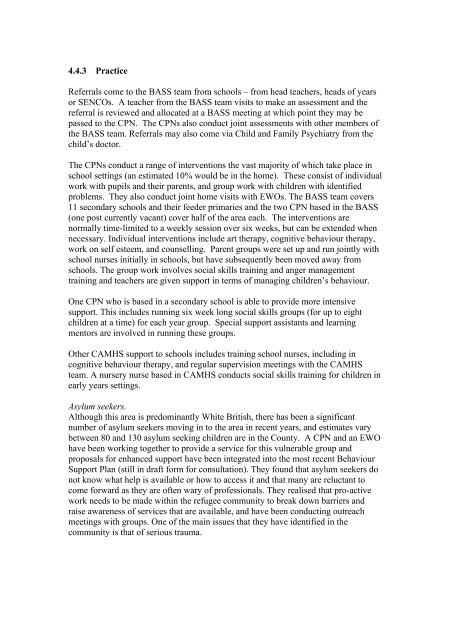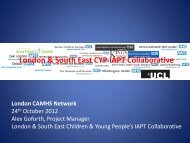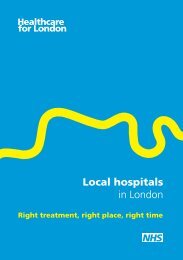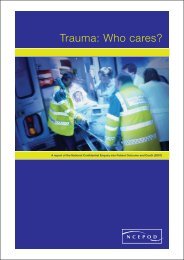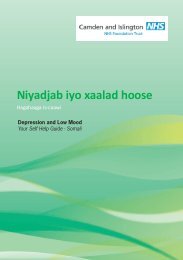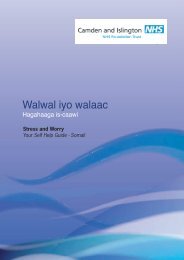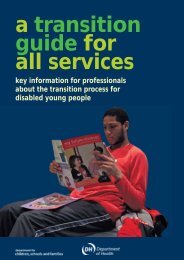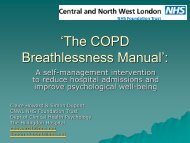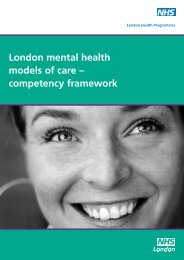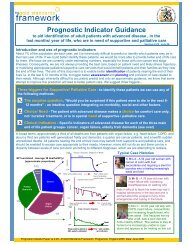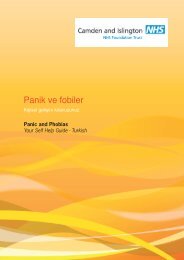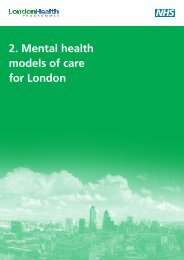(CAMHS) and Schools - London Health Programmes
(CAMHS) and Schools - London Health Programmes
(CAMHS) and Schools - London Health Programmes
You also want an ePaper? Increase the reach of your titles
YUMPU automatically turns print PDFs into web optimized ePapers that Google loves.
4.4.3 Practice<br />
Referrals come to the BASS team from schools – from head teachers, heads of years<br />
or SENCOs. A teacher from the BASS team visits to make an assessment <strong>and</strong> the<br />
referral is reviewed <strong>and</strong> allocated at a BASS meeting at which point they may be<br />
passed to the CPN. The CPNs also conduct joint assessments with other members of<br />
the BASS team. Referrals may also come via Child <strong>and</strong> Family Psychiatry from the<br />
child’s doctor.<br />
The CPNs conduct a range of interventions the vast majority of which take place in<br />
school settings (an estimated 10% would be in the home). These consist of individual<br />
work with pupils <strong>and</strong> their parents, <strong>and</strong> group work with children with identified<br />
problems. They also conduct joint home visits with EWOs. The BASS team covers<br />
11 secondary schools <strong>and</strong> their feeder primaries <strong>and</strong> the two CPN based in the BASS<br />
(one post currently vacant) cover half of the area each. The interventions are<br />
normally time-limited to a weekly session over six weeks, but can be extended when<br />
necessary. Individual interventions include art therapy, cognitive behaviour therapy,<br />
work on self esteem, <strong>and</strong> counselling. Parent groups were set up <strong>and</strong> run jointly with<br />
school nurses initially in schools, but have subsequently been moved away from<br />
schools. The group work involves social skills training <strong>and</strong> anger management<br />
training <strong>and</strong> teachers are given support in terms of managing children’s behaviour.<br />
One CPN who is based in a secondary school is able to provide more intensive<br />
support. This includes running six week long social skills groups (for up to eight<br />
children at a time) for each year group. Special support assistants <strong>and</strong> learning<br />
mentors are involved in running these groups.<br />
Other <strong>CAMHS</strong> support to schools includes training school nurses, including in<br />
cognitive behaviour therapy, <strong>and</strong> regular supervision meetings with the <strong>CAMHS</strong><br />
team. A nursery nurse based in <strong>CAMHS</strong> conducts social skills training for children in<br />
early years settings.<br />
Asylum seekers.<br />
Although this area is predominantly White British, there has been a significant<br />
number of asylum seekers moving in to the area in recent years, <strong>and</strong> estimates vary<br />
between 80 <strong>and</strong> 130 asylum seeking children are in the County. A CPN <strong>and</strong> an EWO<br />
have been working together to provide a service for this vulnerable group <strong>and</strong><br />
proposals for enhanced support have been integrated into the most recent Behaviour<br />
Support Plan (still in draft form for consultation). They found that asylum seekers do<br />
not know what help is available or how to access it <strong>and</strong> that many are reluctant to<br />
come forward as they are often wary of professionals. They realised that pro-active<br />
work needs to be made within the refugee community to break down barriers <strong>and</strong><br />
raise awareness of services that are available, <strong>and</strong> have been conducting outreach<br />
meetings with groups. One of the main issues that they have identified in the<br />
community is that of serious trauma.


